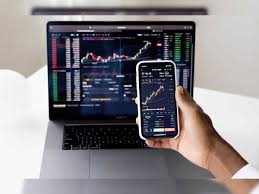In the rapidly evolving landscape of forex market, technological advances have ushered in a new era of efficiency and innovation. One of the most transformative elements is the rise of automation, where sophisticated algorithms and trading robots are changing the way market participants engage with the foreign exchange markets. In this article, we explore how technological advances and automation are reshaping Forex trading and providing traders with unprecedented opportunities.
**Algorithmic Trading: The Rise of Intelligent Automation:**
Algorithmic trading, often referred to as algo trading, involves the use of computer algorithms to execute trades automatically. These algorithms are designed to analyze market data, identify patterns, and execute trades at optimal moments. The precision and speed of algorithmic trading have revolutionized the Forex landscape, allowing traders to engage with the market in real-time and capitalize on fleeting opportunities.
**Efficiency and Speed:**
One of the primary advantages of automation in Forex trading is the unparalleled efficiency and speed it brings to the table. Algorithms can process vast amounts of market data within milliseconds, making split-second trading decisions that would be humanly impossible. This speed advantage allows traders to execute orders with precision and take advantage of price movements in volatile markets.
**Elimination of Emotional Bias:**
Human emotions, such as fear and greed, can influence trading decisions and lead to suboptimal outcomes. Automation eliminates the emotional bias from trading, as algorithms execute trades based on predefined rules and criteria. This emotion-free approach enhances discipline and ensures that trading decisions are driven by strategy rather than impulsive reactions to market fluctuations.
**Backtesting and Optimization:**
Automation enables traders to backtest and optimize their trading strategies with historical data. By simulating the performance of algorithms over past market conditions, traders can assess the viability and effectiveness of their strategies. This iterative process allows for refinement and improvement, ensuring that algorithms are well-equipped to navigate diverse market scenarios.
**24/7 Trading:**
Automation extends the trading capabilities beyond human limitations, enabling 24/7 engagement with the Forex markets. Trading robots can operate around the clock, taking advantage of opportunities in different time zones and reacting to global market developments in real-time. This continuous presence is a significant advantage for traders looking to capitalize on diverse market conditions.
**Risk Management and Portfolio Diversification:**
Automation plays a crucial role in risk management and portfolio diversification. Trading robots can implement predefined risk parameters, including stop-loss orders and position sizing, to protect capital. Additionally, automation allows for the simultaneous execution of trades across multiple currency pairs, contributing to a well-diversified trading portfolio.
**Accessibility for Retail Traders:**
While institutional players have long utilized algorithmic trading, technological advances have democratized access for retail traders. The availability of trading platforms and tools equipped with automation features empowers individual traders to leverage the benefits of algorithmic strategies, contributing to a more level playing field in the Forex market.
**The Future of Forex Trading:**
As technology continues to advance, the role of automation in Forex trading is likely to expand further. Machine learning and artificial intelligence are increasingly being integrated into trading algorithms, allowing systems to adapt and learn from evolving market conditions. The future holds the promise of even more sophisticated and intelligent automation in the world of Forex trading.
In conclusion, technological advances and automation are transforming Forex trading, providing traders with unprecedented tools and capabilities. The efficiency, speed, and systematic approach offered by automation redefine how market participants engage with the Forex markets. As the landscape continues to evolve, traders who embrace and adapt to these technological advancements position themselves for enhanced success in the dynamic world of currency trading.



